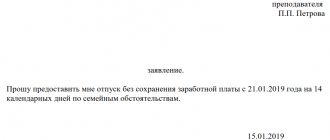Allocation of VAT by calculation
As a general rule, the contract price is determined taking into account VAT. If the tax amount is allocated separately in the contract, then it is the seller who will present it to the buyer (clauses 1, 4, article 168 of the Tax Code of the Russian Federation).
If the amount of VAT is not allocated in the contract, then the seller must independently, by calculation, allocate the VAT from the contract price and present it to the buyer (clause 1 of Article 168, clause 1 of Article 173 of the Tax Code of the Russian Federation). This rule corresponds to the resolution of the Plenum of the Supreme Arbitration Court dated May 30, 2014 No. 33, in paragraph 17 of which the following is established: if the VAT amount is not allocated in the contract, then by default it is included in the contract price.
This rule does not apply to cases where, under the terms of the contract, VAT is not included in the price of goods, works, or services.
If the amount of VAT is not allocated in the contract, but the contract does not indicate that the tax is not included in the price, then such an agreement does not provide for the buyer’s obligation to pay the seller VAT in addition to the contract price. Therefore, the seller must extract VAT from the contract price when issuing an invoice. To do this, the amount specified in the contract must be multiplied by 20/120 or 10/110 - depending on the tax rate at which the goods, works, services sold, and transferred property rights are taxed (clause 4 of Article 164 of the Tax Code of the Russian Federation).
Example 1
According to the purchase and sale agreement for the refrigerator, its cost is 24,000 rubles. The amount of VAT is not allocated in the contract, but the contract does not indicate that the cost of the refrigerator does not include VAT. The contract does not contain any conditions for paying VAT in addition to the price of the refrigerator. Since this sale is subject to VAT at a rate of 20%, the seller will calculate the tax as follows:
24,000 rub. × 20/120 = 4,000 rub.
When issuing an invoice, the seller will include the following information:
- the cost of the refrigerator excluding VAT is 20,000 rubles;
- VAT amount – 4,000 rubles;
- the cost of the refrigerator including VAT is 24,000 rubles.
VAT on top of price
It happens that the VAT amount is not allocated in the contract, but the contract contains the following conditions:
In such circumstances, the seller issues an invoice to the buyer with the amount of VAT, which is calculated in excess of the contract price, namely: the amount specified in the contract is multiplied by 20% or 10% - depending on the rate at which the goods sold, work are taxed , services, transferred property rights (clause 1 of article 168 of the Tax Code of the Russian Federation).
The seller will include the following information on the invoice:
- the cost of the refrigerator excluding VAT is 24,000 rubles;
- VAT amount – 4,800 rubles;
- the cost of the refrigerator including VAT is RUB 28,800.
Additionally
How to indicate a VAT clause in a contract?
The agreement with a foreign organization does not specify the amount of VAT. How should the tax agent calculate VAT on such an agreement - on the amount of the agreement at the estimated rate or at the regular rate?
If VAT is not specified in the agreement, then the burden of paying the tax falls on the seller (clause 17 of the Resolution of the Plenum of the Supreme Arbitration Court of the Russian Federation dated May 30, 2014 N 33 “On some issues that arise in arbitration courts when considering cases related to the collection of value added tax”)
Value added tax (VAT) is an indirect tax established by Chapter 21 “Value Added Tax” of the Tax Code of Russia. VAT is a federal tax.
Recommendations for drafting contracts
When concluding a contract, the conditions regarding the inclusion or non-inclusion of the VAT amount in the contract price should be clearly formulated at the stage of preparing its draft. This will allow you to avoid future misunderstandings in relations with the counterparty and claims from inspectors.
Practice shows that buyers do not always transfer additional VAT to sellers if, according to the terms of the contract, the price does not include the amount of VAT. But the buyer’s failure to pay VAT does not affect the seller’s obligation to pay tax to the budget. This means that the seller will have to pay the tax from his own funds.
We separate VAT from the advance amount
In practice, the question of how to calculate VAT “including” most often arises when receiving a partial advance payment from the buyer. For example, the total amount of the contract, including VAT, was 472,000 rubles. The terms of the agreement allow the buyer to transfer an advance of at least 50% of this amount. The buyer transferred 236,000 rubles, and the seller should calculate the tax and reflect it in accounting.
How to calculate VAT including? The formula based on the calculated rate will take the form:
Prepayment amount * 18 / 118.
We get the following value: 236,000 * 18 / 118 = 36,000 (r) - this is exactly the amount of tax calculated at the rate of 18% in the amount of the prepayment received.
Let's calculate the amount without VAT0 = 200,000 (r).
So, in the above example, the buyer transferred 236,000 rubles to the seller as an advance payment, and the tax amount was 36,000 rubles.
The seller's right to claim VAT from the buyer
According to paragraphs. 1, 2 tbsp. 168 of the Tax Code of the Russian Federation, the buyer is obliged to transfer VAT to the supplier, even if the tax is not provided for in the contract or the supplier has not issued an invoice. Since the tax is imposed in addition to the price of the goods (works, services), the buyer must pay it taking into account the calculated tax. Therefore, the seller has the right to issue an additional invoice to the buyer for the amount of VAT accrued above the contract price, and if the buyer refuses to pay this amount, to recover it in court.
This is evidenced by many judicial acts: clause 15 of the information letter of the Presidium of the Supreme Arbitration Court of the Russian Federation dated January 24, 2000 No. 51, resolution of the Arbitration Court of the Volga-Vyatka District dated November 14, 2016 No. F01-4724/2016 in case No. A79-6711/2015, FAS Moscow district dated July 23, 2012 No. A40-68414/11-60-424, FAS Volga-Vyatka District dated March 11, 2012 No. A43-7468/2011, FAS Far Eastern District dated December 12, 2011 No. F03-6075/2011.
However, when claiming VAT from the buyer, one should take into account the three-year limitation period (resolution of the Presidium of the Supreme Arbitration Court of the Russian Federation dated September 29, 2010 No. 7090/10, FAS North-Western District dated August 10, 2011 No. A05-5565/2010).
When to charge VAT and when to deduct: conclusions of YOU
Commentary on the Resolution of the Plenum of the Supreme Arbitration Court regarding the application of Chapter 21 of the Tax Code of the Russian Federation
The Supreme Arbitration Court promulgated the Resolution of the Plenum, dedicated to various controversial VAT issues: tax calculation, acceptance for deduction, submission of documents to the Federal Tax Service and many others. And although these clarifications are intended for courts, accountants of organizations and individual entrepreneurs (taxpayers, tax agents, special regime officers) will be interested in them. After all, tax authorities, when making decisions based on the results of audits, will be guided by the position of Even though from 06.08.2014 the VAS will cease to exist as an independent body. After all, all clarifications of the Plenum of the Supreme Arbitration Court will be valid until the relevant decisions are made by the Plenum of the Supreme Court. We will introduce you to the most significant provisions of the Resolution of the Plenum of the Supreme Arbitration Court. And let's start with questions related to determining the tax base for VAT and submitting documents to tax authorities.
Wrongful presentation of VAT to the buyer
There are cases when the seller misleads a bona fide buyer by claiming to apply an exemption, the use of which is unlawful, and subsequently claims VAT for payment to the buyer. In this situation, the seller himself must be responsible for paying the tax. The judges came to this conclusion in the resolution of the Presidium of the Supreme Arbitration Court of the Russian Federation dated June 14, 2011 No. 16970/10 regarding the performance of work under a government contract.
Similar conclusions are contained in the resolution of the Arbitration Court of the Ural District dated September 24, 2014 No. F09-5967/14 in case No. A76-26562/2013, which concluded that a lessor who has lost the right to use a simplified taxation system does not have the right to increase the amount of rent for the amount of VAT without concluding an additional agreement to the contract. Imposing on a bona fide participant in civil legal relations the obligation to pay VAT that has not been presented for payment is unlawful.
Results
The seller must calculate VAT if its amount is not allocated in the contract. There are 2 options here: VAT is already included in the price of the product. Then the specified amount is multiplied by 20 and divided by 120. Or the cost of the goods is indicated excluding tax, then the cost of material assets will increase by the amount of tax.
Value added tax (VAT) is indirect; it is included in the cost of goods, works, services, property rights and is presented for payment to the buyer. Is it necessary to include VAT in an agreement with a customer and how to avoid controversial situations with a counterparty, said Elena Vozhova, senior legal adviser at the Legal Services Center.
When forming the terms of a payment agreement, everything depends on the taxation system used by the parties to the agreement (STS, OSN, other special regime), the correctness of accounting records and the parties’ awareness of the rules and procedure for paying tax, as well as on a clear indication in the contract of the obligations of the parties in terms of payment of VAT. Based on this, the following contract options are found.
Option 1. VAT in the contract is calculated separately and is indicated in the text along with the cost of goods, work, services, property rights. VAT is highlighted in the contract. In this case, both parties apply a common taxation system. Accordingly, the buyer and seller agree in advance on all the conditions for payment, execution of the agreement and their obligations regarding taxation. In such a situation, the buyer knows the amount of VAT and will pay the tax based on the invoice presented to him.
Option 2. A situation where one of the parties to the agreement applies a special taxation regime, for example, the simplified tax system. Then the contract makes reference to this fact. In most cases, in such transactions there are no conflict or controversial issues, since initially everything is obvious: there is no obligation to calculate VAT, tax legislation does not provide for the requirement to allocate VAT as part of the contract price (see, for example, the letter of the Ministry of Finance of the Russian Federation dated June 1, 2021 No. 03-11-11/38624).
Option 3. The presence of one of the parties to the agreement has the right to receive a tax benefit (Article 145 of the Tax Code of the Russian Federation - exemption from fulfilling the duties of a taxpayer; Article 149 of the Tax Code of the Russian Federation - carrying out transactions not subject to taxation) also implies the legal consequences set out in option 2 The contracts also make reference to preferential circumstances, but indicate the price of the contract as a whole. Additionally, it is recommended to request from the party that has a preferential tax regime, documentary evidence (certificate of state registration of a legal entity, charter with the types of activities of the organization, other documents confirming the right to receive a tax benefit, tax exemption). However, it is not uncommon for contracts to lack a separate line indicating the calculation of VAT and its amount.
What documents and when do you need to submit to the tax authorities, and which ones don’t?
Tax authorities cannot deny the right to exemption from VAT under Art. 145 of the Tax Code due to untimely submission of notification. Let us remind you that those wishing to be exempt from VAT must submit a notification and a package of documents to their Federal Tax Service Inspectorate no later than the day of the month from which they use the right to exemption. As the Supreme Arbitration Court indicated, within the meaning of this norm, the taxpayer only informs the Federal Tax Service Inspectorate of his intention to use the right to exemption. But the consequences of violating the notice period are not defined by law. So an organization or individual entrepreneur can submit a notification to the tax authorities even after the application of the exemption begins, there’s nothing wrong with that
By the way, tax authorities also do not have the right to refuse to extend your VAT exemption if you:
- untimely submit to the Federal Tax Service a notification about the extension of the use of the right to exemption and a package of documents (that is, not on the date of the month following the end of the month's exemption period, but later, for example on the day
- don't imagine them at all.
After all, in this case we are also talking only about informing
Organizations and individual entrepreneurs can receive a VAT exemption if their revenue excluding VAT for the 3 months preceding the month from which they intend to apply the exemption did not exceed 2 million
When calculating the revenue limit for the purpose of VAT exemption under Art. 145 of the Tax Code does not take into account revenue from all operations. As the Supreme Arbitration Court explained, when calculating the two million dollar amount of revenue, it is not necessary to take into account
- revenue from the sale of excisable goods, since in relation to such transactions organizations and individual entrepreneurs do not have the right to apply exemptions
- revenue from transactions exempt from VAT (under Article 149 of the Tax Code of the Russian Federation). After all, the exemption from VAT is due to the inexpediency of collecting tax from persons who have an insignificant volume of transactions subject to VAT. By the way, this position was already expressed by YOU at the end. But only in May of this year, the Federal Tax Service brought this decision of YOU to the local tax authorities as a guide to action. Well, as they say, better late than never.
In addition, the Supreme Arbitration Court indicated that the source of information about the organization’s revenue for obtaining exemption (extension of its period) for the relevant periods (3 and 12 calendar months) are accounting registers. That is, determining the amount of revenue from the sale of goods (work, services) for exemption purposes from VAT is necessary according to accounting rules.
Is your VAT-exempt transaction not covered by the exemption? There is no need to bring documents to the Federal Tax Service within the cameral. It's no secret that tax authorities often exempt from VAT any operation specified in Art. 149 of the Tax Code of the Russian Federation is regarded as the application of a tax benefit. And therefore, as part of a desk audit of VAT declarations, they are required to submit documents confirming the right not to tax the proceeds. The Plenum of the Supreme Arbitration Court considered this issue in sufficient detail. To begin with, he recalled that a tax benefit is the provision of certain categories of taxpayers with advantages over other taxpayers. And then he concluded that it is necessary to submit documents confirming the right to a benefit to the Federal Tax Service Inspectorate only for those listed in Art. 149 of the Tax Code of the Russian Federation for transactions the grounds for exemption of which by their nature correspond to the concept of a tax benefit. In particular, tax benefits are established
- for canteens of educational and medical organizations - sales of food products produced in these canteens are not subject to VAT
- for religious organizations - sales of religious items and religious literature are exempt from VAT
- for public organizations of disabled people - the sale of goods (work, services) produced and sold by these organizations themselves is exempt from VAT
- for bar associations, law bureaus and chambers of lawyers - the provision of services by these colleges, bureaus, chambers to their members in connection with the conduct of their professional activities is not subject to VAT
But when certain transactions are not subject to VAT for all taxpayers, and not just for certain categories, then this is not a benefit. And it is impossible to demand documents within the cameral. Also, documents cannot be demanded when there is no object of taxation according to Let us recall that earlier (in 2012) the Supreme Arbitration Court prohibited tax authorities from demanding “preferential” documents within the cameral from taxpayers who have transactions that are not subject to VAT. The reason was the same: the absence of the obligation to calculate and pay VAT on the transactions named in clause 2 of Art. 146 of the Tax Code of the Russian Federation, since such transactions are not recognized as an object of taxation for all payers
We hope that now the tax authorities will not require documents confirming the “benefit” from absolutely all organizations and individual entrepreneurs that submit Section 7 of the VAT return (where all transactions that are not subject to VAT for various reasons are reflected).
As we can see, most controversial issues were resolved in favor of organizations and individual entrepreneurs. But that is not all. In the next issue you will find out YOUR opinion on how VAT should be deducted in various situations, as well as what VAT rates should be applied and when.
Contract without VAT
It happens that VAT is not indicated in the contract at all. In this case, the seller is still obliged to present VAT to the buyer and pay it (clause 1 of Article 168, clause 1 of Article 173 of the Tax Code of the Russian Federation). However, here you need to correctly calculate the tax and find out whether the VAT amount is included in the contract or not. Depending on what the parties agree on, the tax calculation formula will be different.
If companies decide that tax is included in the contract price, then the formula will be as follows: Contract amount × 20/120 (or 10/110 - depending on the tax rate - Article 164 of the Tax Code of the Russian Federation) = VAT.
If the tax is considered above the cost of the agreement, then to calculate it you need to use another formula: Amount of the agreement × 20% (or 10% - depending on the tax rate - Article 164 of the Tax Code of the Russian Federation) = VAT.
Thus, when calculating and presenting VAT for payment, it is necessary to analyze the terms of a specific agreement. In order to avoid ambiguity in the interpretation of the contract, it is additionally recommended to clearly formulate the conditions for the inclusion or non-inclusion of VAT in the contract at the stage of preparing its draft. Initially, companies must clearly decide whether to include VAT in the contract price or to pay tax on top of the price, and also spell out these conditions in detail in the contract. Upon payment of VAT, the seller may issue an additional invoice to the buyer for the amount of VAT in excess of the contract price. Sometimes companies enter into an additional agreement, with the help of which it is possible to resolve controversial situations regarding the inclusion of VAT in the contract and its payment by the buyer.
In order to avoid ambiguity in the interpretation of the contract, it is additionally recommended to clearly formulate the conditions regarding the inclusion or non-inclusion of VAT in the price of the contract at the stage of preparing its draft.
In what cases is it mandatory?
Type of Agreement | Basis (Civil Code of the Russian Federation) |
| supplies for municipal and state needs | Art. 532 |
| contracting | Art. 535 |
| real estate sales | clause 1 art. 555 |
| company sales | Art. 559 |
| rental | clause 1 art. 614 |
| vehicles without crew | Art. 642 |
| vehicles with crew | Art. 632 |
| buildings and structures | Art. 654 |
| enterprises | Art. 656 |
| financial lease (leasing) | Art. 665 and Art. 28 Federal Law “On financial lease (leasing)” |
| rental | clause 1 art. 626 and paragraph 1 of Art. 630 |
| contract | clause 1 art. 709 |
| construction contract | Art. 746 |
| research, development and technological work | Art. 778 |
| contract work for state and municipal needs | Art. 766 |
| transportation | Art. 790 |
| transport expedition | clause 1 art. 801 |
| loan | clause 1 art. 807 |
Type of Agreement | Basis (Civil Code of the Russian Federation) |
| purchase and sale | clause 1 art. 485 |
| supplies | Art. 506 |
| contracting | Art. 535 |
| energy supply | |
| paid provision of services | clause 1 art. 781 |
Price circumstances
In this regard, if the contract does not directly indicate that the price established therein does not include the amount of tax, and otherwise does not follow from the circumstances preceding the conclusion of the agreement or other terms of the contract, the courts should proceed from the fact that the presented the seller allocates the tax amount to the buyer last of the price specified in the contract, for which it is determined by the calculation method
(clause 4 of article 164 of the Tax Code of the Russian Federation). Thus, according to the conclusions of the court, if, based on the terms of the contract and other circumstances related to the conclusion of the contract, it follows that the price indicated in it is formed without taking into account tax, the application of the estimated tax rate provided for in paragraph 4 of Article 164 of the Tax Code is unfounded.
When do you need to separate the tax from the amount?
Before we figure out, using an example, how to calculate VAT “including”, let’s look at when this is necessary. The Tax Code states that the calculation method of calculation is used by the seller of goods and services in the following cases:
- upon receipt of an advance payment, including partial;
- when payment of VAT is carried out by a tax agent;
- upon resale of property that is subject to tax registration;
- when selling agricultural products and cars that were purchased from individuals;
- in a number of other cases.
The buyer sometimes also has to calculate VAT using the calculation method from the total amount. For example, if he has been issued an invoice including tax, and he plans to pay it in installments.
Legal risks
The existing judicial practice is represented by complex and ambiguous examples. This is due, first of all, to the fact that the parties inattentively and frivolously approach the issue of drawing up contracts and the correct allocation and calculation of the amount of VAT. I will give an example of the most interesting and popular conclusions of the arbitrators.
Buyers do not always transfer VAT to sellers if, according to the terms of the contract, the price does not include the amount of tax. However, this does not affect the seller’s obligation to pay VAT to the budget. In such cases, the seller will have to transfer the tax from his own funds with subsequent recovery of the paid amount from the buyer in court (for example, the resolution of the FAS Moscow District dated July 23, 2012 in case No. A40-68414/11-60-424, FAS Volgo-Vyatka district dated March 11, 2012 in case No. A43-7468/2011, FAS Far Eastern District dated December 12, 2011 No. F03-6075/2011).
Incorrect indication by the parties of the VAT tax rate in the agreement cannot be the basis for exemption from the obligation to reimburse the seller for the tax, regardless of the agreement of this condition by the parties to the agreement.
Payment in addition to the cost of the contract of the corresponding amount of VAT is provided for by the Tax Code and is obligatory for the parties to the contract by virtue of paragraph 1 of Article 422 of the Civil Code (in confirmation of this, see, for example, the decision of the Third Arbitration Court of Appeal dated November 26, 2009 in case No. A33-10186/ 2009, resolution of the FAS North-Western District dated August 10, 2011 in case No. A05-5565/2010, resolution of the FAS North-Western District dated September 27, 2010 in case No. A05-1517/2010).
If the seller demands to recover from the seller VAT accrued on the contract price due to the seller’s unlawful actions, as a result of which the tax benefit was lost, then this demand is illegal, it is an abuse of law (see, for example, the resolution of the Presidium of the Supreme Arbitration Court of the Russian Federation dated 14 June 2011 No. 16970/10 in case No. 05-1486/2010).
In conclusion, I would like to say that the absence of tax provisions in the contract entails additional risks. And if an entrepreneur does this deliberately, then you need to be prepared not only for conflict situations with a partner, but also for arbitration disputes.
Practical encyclopedia of an accountant
All changes for 2021 have already been made to the berator by experts. In answer to any question, you have everything you need: an exact algorithm of actions, current examples from real accounting practice, postings and samples of filling out documents.
Organizations and individual entrepreneurs applying special tax regimes can take part in the procurement. Such companies do not pay VAT. The customer must correctly spell out the terms of the contract so as not to violate the rights of the participants. Imagine that the company won the simplified tax system. What about VAT? Let's look at examples of judicial practice under 44-FZ.
VAT in a contract under 44-FZ: analysis of errors
Law 44-FZ provides equal conditions for participation in procurement, regardless of the legal form and taxation system of participants.
A participant in government tenders can become:
- any legal entity or individual, including an individual entrepreneur (clause 4 of article 3 of the Federal Law of 04/05/2013 No. 44-FZ, Law No. 44-FZ);
- any participant, including those exempt from VAT and applying a special tax regime (for example, simplified tax system, UTII).
Controversial situations arise due to the fact that the customer takes a standard approach to the development of documentation and the draft contract and does not take into account the likely possibility of filing an application by a participant who is not a VAT payer.
Let's look at four typical customer mistakes in applying VAT at the stage of concluding and executing a contract with such participants.
Example: decision of the Federal Antimonopoly Service for the Omsk Region dated August 29, 2016 No. 03-10.1/220-2016.
The customer established in the contract (section III. Information card of the electronic auction, clause 14) the requirement:
OFAS considered that the customer’s actions contradicted the norms of Part 2 of Art. 34 and part 2 of Art. 70 of Law No. 44-FZ. The customer was given an order to exclude this item from the documentation.
Expert Stanislav Gruzin comments on the above standard contract formulation:
Example: decision of the Arbitration Court of the Republic of North Ossetia-Alania dated November 18, 2014 No. A61-2186/14.
The court noted that the customer concludes and pays for the contract at the price proposed by the winner, regardless of what taxation system the latter applies. During the execution of the contract, its price may be reduced by agreement of the parties without changing the quantity of goods, scope of work, services and other conditions. The customer’s actions to reduce the contract price by the amount of VAT before concluding the contract itself are a violation of Law No. 44-FZ.
The antimonopoly authority recognized the customer’s actions as violating Part 10 of Art. 70 of Law No. 44-FZ.
Stanislav Gruzin comments:
Example: Resolution of the Seventh Arbitration Court of Appeal dated March 28, 2016 No. 07AP-1505/2016 in case No. A67-7718/2015 and the Decision of the Arbitration Court of the Republic of Sakha (Yakutia) dated April 24, 2015 in case No. A58-182/2015.
The contract executor, using the simplified tax system, provided the customer with invoices for payment for services rendered in an amount equal to the contract price without VAT. The customer paid for the contract excluding VAT, citing the fact that the contractor is not a payer of such tax.
As the courts have indicated, the customer must pay for the work at the price established by the contract, according to the auction documentation, regardless of whether the supplier is a VAT payer or not.
A person who is not recognized as a VAT payer is obliged to independently transfer to the budget the amount of tax paid as part of the price of goods (work, services) (clause 5 of Article 173 of the Tax Code of the Russian Federation). It is the supplier's task to transfer VAT to the budget. If he does not do this, he faces claims from the tax authorities. But they won’t be available to the customer.
Example: Resolution of the Fifteenth Arbitration Court of Appeal dated August 27, 2015 No. 15AP-12729/2015 in case No. A53-10584/2015
The customer and the contractor entered into a contract using the simplified tax system, the price of which does not include VAT. The work performed was paid in full. Based on the decision of the financial control body that the cost of the work was too high, the customer demanded to recover unjust enrichment. The customer's request was denied. The fact is that the contract price is fixed and determined for the entire period of its execution. Changing the price is allowed only in cases provided for in Art. 34 and 95 of Law No. 44-FZ.
If the terms of the contract are fulfilled properly, the customer is obliged to pay the cost of the work in the amount established by the winner, regardless of the taxation system applied by the latter. The VAT amount is recognized as the profit of the winner who is not a payer of such tax. The parties did not enter into an agreement to change the price of the disputed contract. The customer must pay for the work in the amount provided for in the estimate.
Categories
If the contract uses incorrect language or does not take into account the actual actions between the parties, then serious tax consequences may arise. For clarity, we present episodes from modern arbitration practice. Note! Every word in a contract matters. We must not forget that when concluding an agreement for the provision of services, for example legal ones, you are dealing with a specialist in this matter. Subsequently, if a controversial situation arises, any inaccurate wording can play a cruel joke on the enterprise. If any term or phrase of the contract is not clear, it is advisable to seek clarification from another, independent specialist.
This is precisely the situation that arose in the case considered in the Resolution of the Tenth Arbitration Court of Appeal dated May 6, 2008 No. A41-K1-24439/06. Municipal Unitary Enterprise "City Housing Administration" entered into an agreement to represent its interests in courts of general jurisdiction, the bailiff service for the consideration of civil cases for the collection of debts for housing and communal services. According to one of the terms of this agreement, for the provision of the entire volume of instructions under the agreement, the municipal unitary enterprise must pay 4% of the actually collected amount of debt for housing and communal services and 80% of the actually collected penalties. At the same time, the court did not take into account another clause of the agreement, regulating that settlement with the counterparty is made after 20 days after the receipt of funds from the debtors to the company’s current account, since such a settlement procedure is assumed in the case of voluntary satisfaction of the counterparty’s claims, and in this case the dispute is pending in court. The result of the agreement was that, although the company did not receive the expected amount from the debtors in full, the counterparty had to pay remuneration based on the amount of debt actually collected (by a court decision), and not the funds actually received into the current account. At the same time, everyone knows how reluctant debtors are to comply with court demands for debt repayment (a court decision to collect debt does not at all mean immediate receipt of money from debtors).
We study the terms of the contract
The advertising agency submitted for consideration contracts concluded with advertisers (clients) and companies that actually provide services for the dissemination of advertising information at outdoor advertising sites. According to the subject of the contract, the agency undertook to perform, on the customer’s instructions, a range of services for the production, placement, display and maintenance of posters and banners on advertising structures presented by the customer. Since the advertising agency did not have advertising structures, to fulfill the customer’s instructions, it turned to the company that owns the structures on which the client’s advertising should be placed. According to the agreement concluded between the advertising agency and the company that owns the structures, all responsibilities for production, placement, display and maintenance were transferred to the owner of the facility. The agreement was concluded in the form of a contract for the provision of paid services, where the advertising agency acted as the customer for a set of services for conducting an advertising campaign for the dissemination of advertising information on advertising structures. The advertising structures of the service provider were located in a city of federal significance, where a taxation system in the form of UTII was introduced. Considering that in relations with the client-advertiser the advertising agency acted as a provider of a range of services for the distribution of outdoor advertising using advertising structures, the income derived from this activity should have been subject to UTII taxation. However, the advertising agency did not take this circumstance into account in a timely manner and increased the cost of its services by the amount of VAT. In the accounting records of the advertising agency, this transaction was reflected as a transaction under a contract for the provision of paid services involving a contractor. In ch. 26.3 “Taxation system in the form of a single tax on imputed income for certain types of activities” of the Tax Code of the Russian Federation does not contain information about whether the payer of this tax is an advertising agency engaged in the distribution of outdoor advertising using advertising structures, if an agency agreement is concluded between it and the client contract Regarding this intermediary activity, there are clarifications from the Ministry of Finance of Russia and the Federal Tax Service of Russia that the entrepreneurial activity of intermediaries (agents, commission agents, attorneys) in concluding rental agreements for advertising structures for the customer (principal) with the subsequent placement by the contractor (third party) of advertising on such structures information about the customer is not subject to transfer for payment of UTII (letters of the Ministry of Finance of Russia dated April 14, 2005 No. 03-06-05-04/95, dated June 16, 2006 No. 03-11-04/3/290, dated November 28, 2006 No. 03- 11-04/3/509, dated December 21, 2007 No. 03-11-04/3/509, Federal Tax Service of Russia dated April 7, 2005 No. 22-2-14/520, Federal Tax Service for Moscow dated August 4, 2005 No. 18- 11/3/55311, etc. Having carefully examined the contracts and obligations arising from them, and also taking into account that the advertising agency did not actually independently carry out any actions to fulfill the contract, we can conclude that in relations with the client and the contractor the advertising agency actually acted An analysis of the norms of civil legislation of the Russian Federation regarding the regulation of intermediary contracts (orders, commissions, agency) shows that within the framework of contracts of this category, as a rule, one party, on behalf of the other party, undertakes to carry out legal and other actions, including transactions. In this case, the wording “provision of a service” is not applied in any case. Thus, in our opinion, the intermediary transaction was covered up by a transaction for the provision of services. Therefore, to the transaction that the parties really had in mind, taking into account its essence, the rules relating to it should be applied. Having calculated the possible tax consequences associated with an incorrect determination of the tax and the object of taxation, the advertising agency came to the decision that certain changes should be made in the relations between the parties to the transaction. It is also necessary to make amendments to accounting and tax accounting. The option of making changes to the contract with the client was considered optimal. If previously the parties to the contract acted as a customer and a contractor, then after the changes were made, the parties began to act as a principal and an agent. Changes were also made to the subject of the agreement.
What are the consequences of saying “including VAT” in a contract after the agreed price?
Often, a small “makeweight” in the form of VAT is added to the contract price agreed upon by the parties (Article 424 of the Civil Code of the Russian Federation) (clause 1 of Article 168 of the Tax Code of the Russian Federation), which should be formed based on the norms of tax law. At the same time, all ambiguities in determining the amount of VAT are fraught with big problems. If you follow the literal logic of the Tax Code of the Russian Federation, then the price in the contract should be determined as follows: 100 rubles. + 18 rub. VAT = 118 rub. (including VAT). If the price is expressed by the wording “118 rubles. (including VAT)”, this does not mean that the amount of VAT will be determined in accordance with clause 4 of Art. 164 of the Tax Code of the Russian Federation by calculation method: 118 rubles. × 18 / 118 = 18 rub. Let's look at possible problems using specific situations as examples.
Example 1
The contract price does not include the amount of VAT. Two organizations entered into a real estate purchase and sale agreement, in which the price of the goods was agreed including VAT. At the time of conclusion of the agreement, both parties were under the general taxation regime. Payment for the goods was made in installments. From the next tax period, the seller switched to a simplified taxation system and ceased to be a VAT payer. However, the price of the goods remained unchanged, that is, even after the transition to the simplified tax system, the seller continued to present to the buyer for payment the previous amounts specified in the payment schedule, but without VAT. This served as the basis for filing a claim by the buyer, who considered that the amounts received by the seller in an amount equal to VAT constituted unjust enrichment.
The court did not agree with the buyer, pointing out that the buyer timely learned about the issuance of invoices without VAT, but did not take any measures to change the price in the contract. The buyer's actions in paying the invoices issued by the seller with the price indicated on them indicate that the seller has agreed to this price.
Since the parties agreed on the price, there can be no talk of unjust enrichment of the seller (Resolution of the Federal Antimonopoly Service of the West Siberian District dated July 17, 2007 No. F04-4647/2007(36197-A75-12)).
One can argue with the above court decision, since VAT is not an integral part of the price, although the court, most likely, was guided by a common contract condition such as “negotiated price 118 rubles. (including VAT)". In this case, it is difficult to separate private law from public law. Taxpayers have already faced a similar situation when, from 01/01/2004, the VAT tax rate was reduced from 20% to 18%, as a result of which contract prices increased:
- until 01/01/2004 the phrase in the contract “120 rub. (including VAT)” at a rate of 20% meant: price 100 rubles. + 20 rub. VAT;
- after the specified date the same wording “120 rubles. (including VAT)” meant something else: the price was 101.69 rubles. + 18.31 rub. VAT.
To avoid similar situations in the future, the contract should directly stipulate not only the VAT tax rate, but also the amount of the tax, as well as a mandatory condition on the unchanged price (excluding VAT) and on the recalculation of obligations under the contract in the event of a reduction in the VAT tax rate or a change in tax status seller.
Example 2
The amount of VAT may depend on the characteristics of the seller’s activities. The buyer (plaintiff) and the seller (defendant) entered into a contract for the sale and purchase of non-residential premises, and the contract stated that the price of the property in rubles was equivalent to USD 1,716,000, including VAT calculated at a rate of 18% .
The buyer transferred 45,871,482.01 rubles to the seller, indicating in the payment orders VAT for a total amount of 6,997,344.72 rubles.
However, the seller issued an invoice to the buyer, which indicated the cost of the object in the amount of RUB 44,079,194.17. and VAT in the amount of RUB 1,792,287.84.
The buyer considered that the difference between the amount of VAT to be charged to the plaintiff and the amount of VAT actually paid to the defendant constituted unjust enrichment of the defendant. Its acquisition by the defendant is not provided for by law, and the amount of the tax payment cannot be determined arbitrarily by agreement. Therefore, the buyer filed a claim with the arbitration court.
The court of first instance rejected the claim, based on the following. If in the contract the price is established as an amount including VAT, then the obligation must be fulfilled at a price determined in the corresponding amount minus VAT. The calculation of the VAT amount is regulated by tax legislation and cannot be the subject of agreement between the parties. The court also pointed out that the calculation of VAT at a rate of 18%, as provided for in the contract, does not comply with the imperative norms of the Tax Code of the Russian Federation and cannot indicate a change in the contract price due to the application of VAT at a calculated rate of 18/118.
The appellate court overturned the decision of the first instance court and upheld the claim. Based on the literal interpretation of the words and expressions contained in the purchase and sale agreement and comparison of their content, the appellate court came to the conclusion: the parties agreed on the price of non-residential premises in the ruble equivalent of 1,716,000 US dollars, which is 45,871,482.01 rubles, from of which RUB 38,874,137.29. — the cost of the property and 6,997,344.72 rubles. — VAT calculated at the rate of 18%.
As follows from the seller’s explanations, VAT in the amount of RUB 1,792,287.84. indicated in the invoice, since he acquired the non-residential premises for the purpose of using them in activities that are not subject to VAT on the basis of clause 1 of Art. 149 of the Tax Code of the Russian Federation. In this regard, the tax paid was included by the seller in the cost of fixed assets in accordance with Art. 170 Tax Code of the Russian Federation. When selling an object, the tax was calculated according to the rules of clause 3 of Art. 154 of the Tax Code of the Russian Federation (that is, from the difference between the sales price and the cost of this property).
According to Art. 1102 of the Civil Code of the Russian Federation, a person who, without the grounds established by law, other legal acts or transaction, acquired or saved property (acquirer) at the expense of another person (victim), is obliged to return to the latter the unjustly acquired or saved property (unjust enrichment).
The buyer paid the seller RUB 38,874,137.29 under the contract. the cost of the object and 6,997,344.72 rubles. VAT. However, VAT actually amounted to RUB 1,792,287.84. The difference is RUB 5,205,056.88. should be recognized as overpaid; it constitutes unjust enrichment for the seller.
The cassation court agreed with the appellate court. At the same time, he rejected the seller’s argument that when concluding a purchase and sale agreement, the buyer should have known the procedure for calculating VAT by the seller, since the buyer does not have such an obligation (Resolution of the Federal Antimonopoly Service of the North-Western District dated July 11, 2008 No. A56-13117/2007) .
Thus, one should also keep in mind the peculiarities of calculating VAT for individual business transactions, when the expression “including VAT” may give rise to an increase in price not agreed upon by the parties. In the Determination of the Supreme Arbitration Court of the Russian Federation dated June 29, 2007 No. 7574/07, with reference to the Resolution of the Presidium of the Supreme Arbitration Court of the Russian Federation dated January 30, 2007 No. 10627/06, attention was drawn to the fact that the erroneous receipt of money in excess of the price of the service determined by the parties is unjust enrichment. However, courts usually make similar conclusions in cases where an incorrect VAT tax rate was applied (for example, 18% instead of 0%). The expression “contract price, including VAT” can be interpreted by the court in relation to specific circumstances:
- during the period when the seller paid VAT, this meant that the contract price included VAT, which was calculated at the calculated rate of 18/118;
- during the period when the seller lost his VAT status and the contract price was not revised, this means that the contract price increased to the previous price plus VAT.
In cases where the amount of VAT is calculated not on the entire price, but only on the difference (based on clause 3 of Article 154 of the Tax Code of the Russian Federation), the seller and buyer must stipulate directly in the contract:
- price;
- the amount of VAT (the amount of which will depend solely on the difference between the sale price and the cost, including input VAT).
The text of the agreement should be as close as possible to the wording of the Tax Code of the Russian Federation; it should not be overloaded with incomprehensible terms. It is especially important to take into account this circumstance when describing the subject of the contract, since it is its essential condition.








